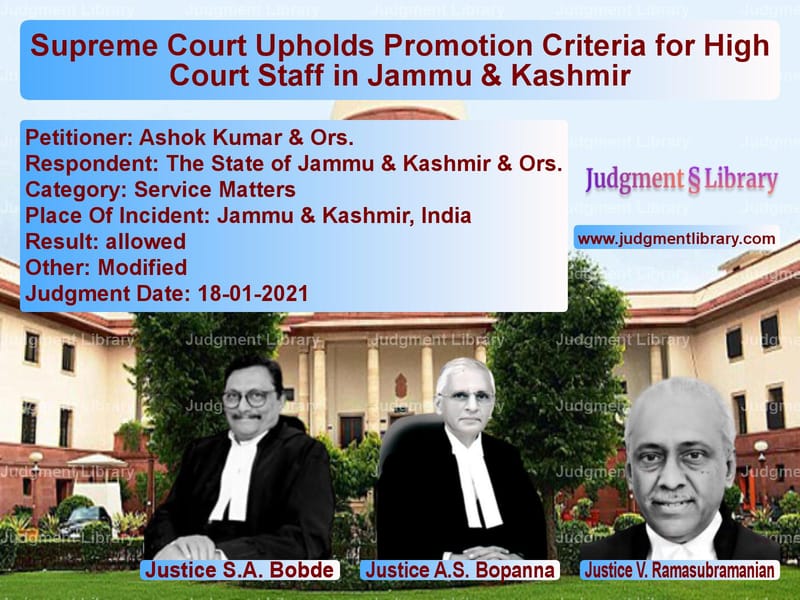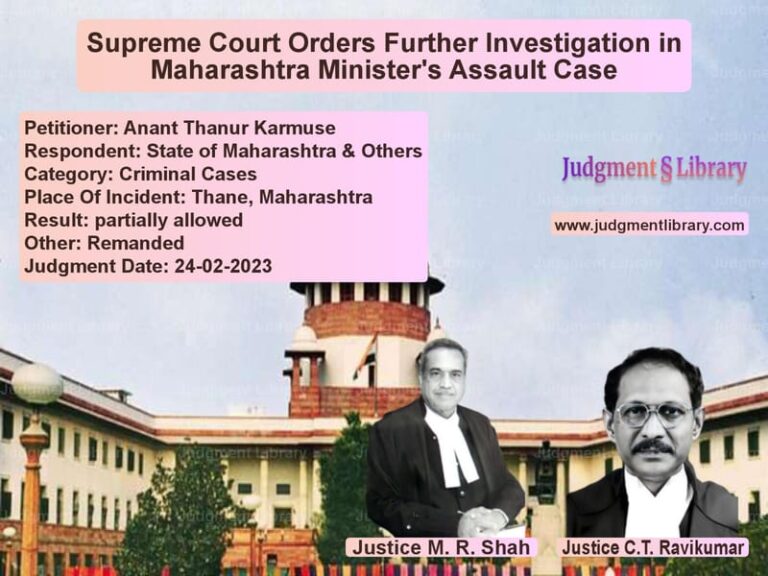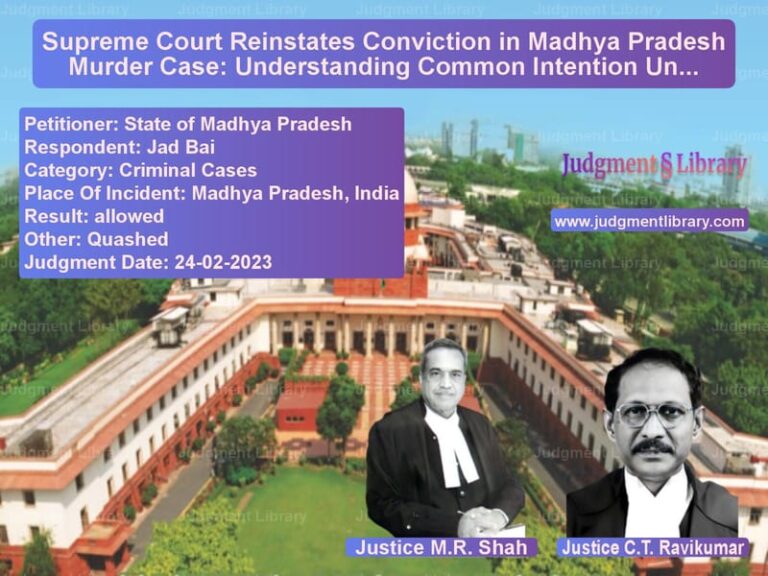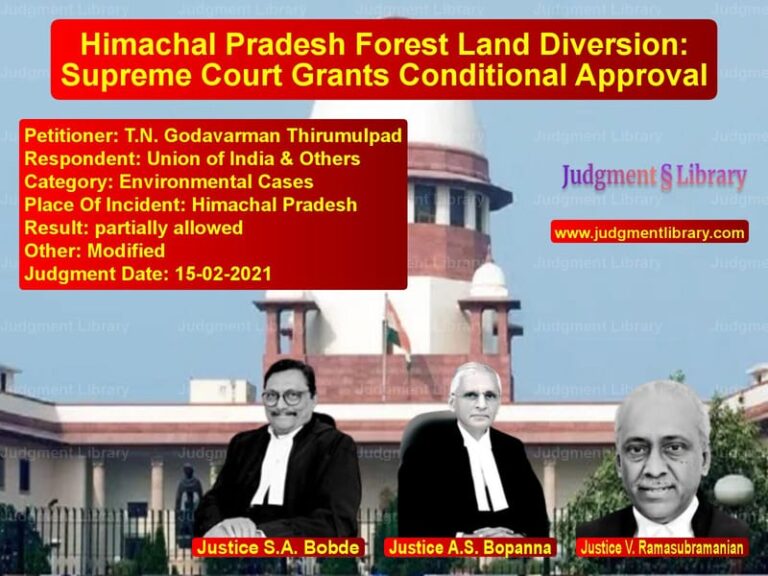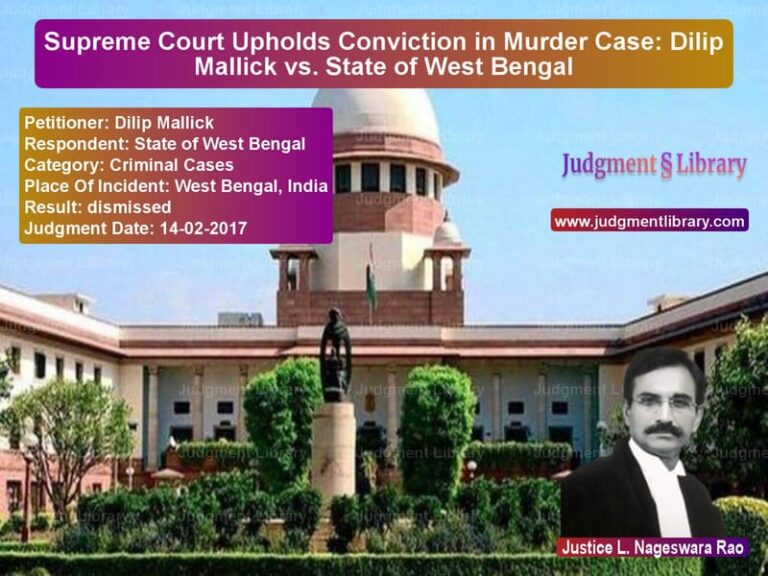Supreme Court Upholds Promotion Criteria for High Court Staff in Jammu & Kashmir
The Supreme Court of India, in the case of Ashok Kumar & Ors. vs. The State of Jammu & Kashmir & Ors., addressed a significant dispute regarding the promotion of High Court staff. The judgment clarified the authority of the Chief Justice in prescribing qualifications for promotions and ruled that educational qualifications can be a valid criterion for career progression.
Background of the Case
The case involved a challenge to an administrative order issued by the Chief Justice of the High Court of Jammu & Kashmir, which prescribed specific qualifications for promotion to the post of Head Assistant. The appellants, who had met these qualifications at the time of their appointment, contested the promotions of certain Senior Assistants who had initially joined as Class IV employees and had been promoted despite lacking the prescribed educational qualifications.
The High Court quashed the Chief Justice’s order, leading to the present appeal before the Supreme Court.
Legal Issues Raised
- Whether the Chief Justice had the authority to prescribe educational qualifications for promotions.
- Whether the classification based on educational qualifications violated Articles 14 and 16 of the Constitution.
- Whether the High Court’s ruling setting aside the qualifications for promotion was justified.
Petitioner’s (Ashok Kumar & Ors.) Arguments
- The Chief Justice’s power to prescribe qualifications was derived from Section 108(2) of the Constitution of Jammu & Kashmir and the Jammu & Kashmir High Court Staff (Conditions of Service) Rules, 1968.
- The Chief Justice had issued an office order in 2008, clearly stating that only graduates were eligible for promotion to Head Assistant.
- The contesting respondents were promoted despite not meeting these qualifications.
- The High Court had erred in ruling that all Senior Assistants formed a homogeneous group and that differentiation based on educational qualifications was unconstitutional.
Respondent’s (State of Jammu & Kashmir & Ors.) Arguments
- The contesting respondents had risen through the ranks based on their experience and service record.
- They were promoted in accordance with established procedures, and their promotions should not be set aside based on a later qualification requirement.
- The office order issued by the Chief Justice was not put before the Full Court for approval and was therefore invalid.
- The classification based on educational qualifications violated the principle of equal opportunity in public employment.
Supreme Court’s Observations
The Supreme Court examined the rules governing High Court staff promotions and made the following key observations:
- Under Section 108 of the Constitution of Jammu & Kashmir, the Chief Justice has the authority to make rules for the service conditions of High Court staff.
- Rule 6 of the Jammu & Kashmir High Court Staff (Conditions of Service) Rules, 1968, explicitly empowers the Chief Justice to lay down qualifications for appointment and promotion.
- Educational qualifications can be a valid criterion for classification and do not violate Articles 14 and 16 of the Constitution.
- The High Court erred in ruling that all Senior Assistants formed a single homogeneous group, as distinctions based on educational qualifications have been upheld in past rulings.
Regarding the argument that the order was not put before the Full Court, the Supreme Court stated:
“An order issued by the Chief Justice in exercise of his statutory authority does not require approval from the Full Court unless explicitly mandated by the governing rules.”
On the issue of retrospective application, the Court noted:
“The order prescribing qualifications for promotion did not affect individuals retrospectively. It only applied to promotions made after its issuance.”
Final Judgment
- The Supreme Court set aside the High Court’s ruling and upheld the validity of the Chief Justice’s office order prescribing educational qualifications for promotion.
- The promotions granted in violation of these qualifications were held to be irregular.
- However, considering the long service of the contesting respondents, the Court allowed them to retain their positions without reversion.
- Future promotions were directed to be made strictly in accordance with the prescribed qualifications.
Implications of the Judgment
- Judicial Authority in Service Matters: The ruling reinforces the Chief Justice’s power to prescribe qualifications for High Court staff.
- Educational Qualifications as a Valid Criterion: The decision affirms that educational qualifications can be a legitimate basis for classification in promotions.
- Clarity on Retrospective Application: The Court clarified that new qualifications apply prospectively and do not invalidate past promotions.
- Seniority and Qualifications: Employees promoted in violation of qualification requirements may not be reverted, but future promotions must comply with prescribed criteria.
Conclusion
The Supreme Court’s ruling in Ashok Kumar & Ors. vs. The State of Jammu & Kashmir & Ors. sets a significant precedent in service law. It clarifies the authority of the Chief Justice in prescribing qualifications, affirms the validity of classification based on educational qualifications, and provides guidance on handling promotions that do not meet prescribed standards. The judgment balances administrative discretion with employee rights, ensuring fairness in career progression.
Petitioner Name: Ashok Kumar & Ors..Respondent Name: The State of Jammu & Kashmir & Ors..Judgment By: Justice S.A. Bobde, Justice A.S. Bopanna, Justice V. Ramasubramanian.Place Of Incident: Jammu & Kashmir, India.Judgment Date: 18-01-2021.
Don’t miss out on the full details! Download the complete judgment in PDF format below and gain valuable insights instantly!
Download Judgment: ashok-kumar-&-ors.-vs-the-state-of-jammu-&-supreme-court-of-india-judgment-dated-18-01-2021.pdf
Directly Download Judgment: Directly download this Judgment
See all petitions in Promotion Cases
See all petitions in Public Sector Employees
See all petitions in Recruitment Policies
See all petitions in Judgment by S. A. Bobde
See all petitions in Judgment by A. S. Bopanna
See all petitions in Judgment by V. Ramasubramanian
See all petitions in allowed
See all petitions in Modified
See all petitions in supreme court of India judgments January 2021
See all petitions in 2021 judgments
See all posts in Service Matters Category
See all allowed petitions in Service Matters Category
See all Dismissed petitions in Service Matters Category
See all partially allowed petitions in Service Matters Category

